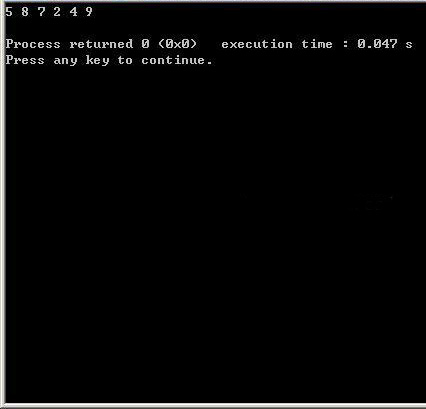- *
- *Copyright (c)2017,烟台大学计算机与控制工程学院
- *All rights reserved.
- *文件名称:sq
- *作 者:张思琦
- *完成日期:2017年12月7日
- *版 本 号:v1.0
- *问题描述:建设“顺序表”算法库
- *输入描述:函数输入
- *程序输出:函数输出
- */
问题及代码:
领会“0207将算法变程序”部分建议的方法,建设自己的专业基础设施算法库。这一周,建的是顺序表的算法库。
算法库包括两个文件:
头文件:list.h,包含定义顺序表数据结构的代码、宏定义、要实现算法的函数的声明;
源文件:list.cpp,包含实现各种算法的函数的定义
请采用程序的多文件组织形式,在项目1的基础上,建立如上的两个文件,另外再建立一个源文件,编制main函数,完成相关的测试工作。
- #ifndef LIST_H_INCLUDED
- #define LIST_H_INCLUDED
- #define MaxSize 50
- typedef int ElemType;
- typedef struct
- {
- ElemType data[MaxSize];
- int length;
- } SqList;
- void CreateList(SqList *&L, ElemType a[], int n);//用数组创建线性表
- void InitList(SqList *&L);//初始化线性表InitList(L)
- void DestroyList(SqList *&L);//销毁线性表DestroyList(L)
- bool ListEmpty(SqList *L);//判定是否为空表ListEmpty(L)
- int ListLength(SqList *L);//求线性表的长度ListLength(L)
- void DispList(SqList *L);//输出线性表DispList(L)
- bool GetElem(SqList *L,int i,ElemType &e);//求某个数据元素值GetElem(L,i,e)
- int LocateElem(SqList *L, ElemType e);//按元素值查找LocateElem(L,e)
- bool ListInsert(SqList *&L,int i,ElemType e);//插入数据元素ListInsert(L,i,e)
- bool ListDelete(SqList *&L,int i,ElemType &e);//删除数据元素ListDelete(L,i,e)#endif // LIST_H_INCLUDED
- #endif </SPAN>
list.h
#ifndef LIST_H_INCLUDED
#define LIST_H_INCLUDED
#define MaxSize 50
typedef int ElemType;
typedef struct
{
ElemType data[MaxSize];
int length;
} SqList;
void CreateList(SqList *&L, ElemType a[], int n);//用数组创建线性表
void InitList(SqList *&L);//初始化线性表InitList(L)
void DestroyList(SqList *&L);//销毁线性表DestroyList(L)
bool ListEmpty(SqList *L);//判定是否为空表ListEmpty(L)
int ListLength(SqList *L);//求线性表的长度ListLength(L)
void DispList(SqList *L);//输出线性表DispList(L)
bool GetElem(SqList *L,int i,ElemType &e);//求某个数据元素值GetElem(L,i,e)
int LocateElem(SqList *L, ElemType e);//按元素值查找LocateElem(L,e)
bool ListInsert(SqList *&L,int i,ElemType e);//插入数据元素ListInsert(L,i,e)
bool ListDelete(SqList *&L,int i,ElemType &e);//删除数据元素ListDelete(L,i,e)#endif // LIST_H_INCLUDED
#endif
- #include <stdio.h>
- #include <malloc.h>
- #include "list.h"
- //用数组创建线性表
- void CreateList(SqList *&L, ElemType a[], int n)
- {
- int i;
- L=(SqList *)malloc(sizeof(SqList));
- for (i=0; i<n; i++)
- L->data[i]=a[i];
- L->length=n;
- }
- //初始化线性表InitList(L)
- void InitList(SqList *&L) //引用型指针
- {
- L=(SqList *)malloc(sizeof(SqList));
- //分配存放线性表的空间
- L->length=0;
- }
- //销毁线性表DestroyList(L)
- void DestroyList(SqList *&L)
- {
- free(L);
- }
- //判定是否为空表ListEmpty(L)
- bool ListEmpty(SqList *L)
- {
- return(L->length==0);
- }
- //求线性表的长度ListLength(L)
- int ListLength(SqList *L)
- {
- return(L->length);
- }
- //输出线性表DispList(L)
- void DispList(SqList *L)
- {
- int i;
- if (ListEmpty(L)) return;
- for (i=0; i<L->length; i++)
- printf("%d ",L->data[i]);
- printf("\n");
- }
- //求某个数据元素值GetElem(L,i,e)
- bool GetElem(SqList *L,int i,ElemType &e)
- {
- if (i<1 || i>L->length) return false;
- e=L->data[i-1];
- return true;
- }
- //按元素值查找LocateElem(L,e)
- int LocateElem(SqList *L, ElemType e)
- {
- int i=0;
- while (i<L->length && L->data[i]!=e) i++;
- if (i>=L->length) return 0;
- else return i+1;
- }
- //插入数据元素ListInsert(L,i,e)
- bool ListInsert(SqList *&L,int i,ElemType e)
- {
- int j;
- if (i<1 || i>L->length+1)
- return false; //参数错误时返回false
- i--; //将顺序表逻辑序号转化为物理序号
- for (j=L->length; j>i; j--) //将data[i..n]元素后移一个位置
- L->data[j]=L->data[j-1];
- L->data[i]=e; //插入元素e
- L->length++; //顺序表长度增1
- return true; //成功插入返回true
- }
- //删除数据元素ListDelete(L,i,e)
- bool ListDelete(SqList *&L,int i,ElemType &e)
- {
- int j;
- if (i<1 || i>L->length) //参数错误时返回false
- return false;
- i--; //将顺序表逻辑序号转化为物理序号
- e=L->data[i];
- for (j=i; j<L->length-1; j++) //将data[i..n-1]元素前移
- L->data[j]=L->data[j+1];
- L->length--; //顺序表长度减1
- return true; //成功删除返回true
- }
list.cpp
#include <stdio.h>
#include <malloc.h>
#include "list.h"
//用数组创建线性表
void CreateList(SqList *&L, ElemType a[], int n)
{
int i;
L=(SqList *)malloc(sizeof(SqList));
for (i=0; i<n; i++)
L->data[i]=a[i];
L->length=n;
}
//初始化线性表InitList(L)
void InitList(SqList *&L) //引用型指针
{
L=(SqList *)malloc(sizeof(SqList));
//分配存放线性表的空间
L->length=0;
}
//销毁线性表DestroyList(L)
void DestroyList(SqList *&L)
{
free(L);
}
//判定是否为空表ListEmpty(L)
bool ListEmpty(SqList *L)
{
return(L->length==0);
}
//求线性表的长度ListLength(L)
int ListLength(SqList *L)
{
return(L->length);
}
//输出线性表DispList(L)
void DispList(SqList *L)
{
int i;
if (ListEmpty(L)) return;
for (i=0; i<L->length; i++)
printf("%d ",L->data[i]);
printf("\n");
}
//求某个数据元素值GetElem(L,i,e)
bool GetElem(SqList *L,int i,ElemType &e)
{
if (i<1 || i>L->length) return false;
e=L->data[i-1];
return true;
}
//按元素值查找LocateElem(L,e)
int LocateElem(SqList *L, ElemType e)
{
int i=0;
while (i<L->length && L->data[i]!=e) i++;
if (i>=L->length) return 0;
else return i+1;
}
//插入数据元素ListInsert(L,i,e)
bool ListInsert(SqList *&L,int i,ElemType e)
{
int j;
if (i<1 || i>L->length+1)
return false; //参数错误时返回false
i--; //将顺序表逻辑序号转化为物理序号
for (j=L->length; j>i; j--) //将data[i..n]元素后移一个位置
L->data[j]=L->data[j-1];
L->data[i]=e; //插入元素e
L->length++; //顺序表长度增1
return true; //成功插入返回true
}
//删除数据元素ListDelete(L,i,e)
bool ListDelete(SqList *&L,int i,ElemType &e)
{
int j;
if (i<1 || i>L->length) //参数错误时返回false
return false;
i--; //将顺序表逻辑序号转化为物理序号
e=L->data[i];
for (j=i; j<L->length-1; j++) //将data[i..n-1]元素前移
L->data[j]=L->data[j+1];
L->length--; //顺序表长度减1
return true; //成功删除返回true
} - <SPAN style="COLOR: #993399">main.cpp</SPAN>
- #include "list.h"
- int main()
- {
- SqList *sq;
- ElemType x[6]= {5,8,7,2,4,9};
- CreateList(sq, x, 6);
- DispList(sq);
- return 0;
- }
main.cpp
#include "list.h"
int main()
{
SqList *sq;
ElemType x[6]= {5,8,7,2,4,9};
CreateList(sq, x, 6);
DispList(sq);
return 0;
} 运行结果:
知识点总结:
加强了对多文件组织要有更深层次的体会。
学习心得:
加强了指向引用类型的指针的使用,便于我们能够更熟练的应用。






















 2094
2094

 被折叠的 条评论
为什么被折叠?
被折叠的 条评论
为什么被折叠?








